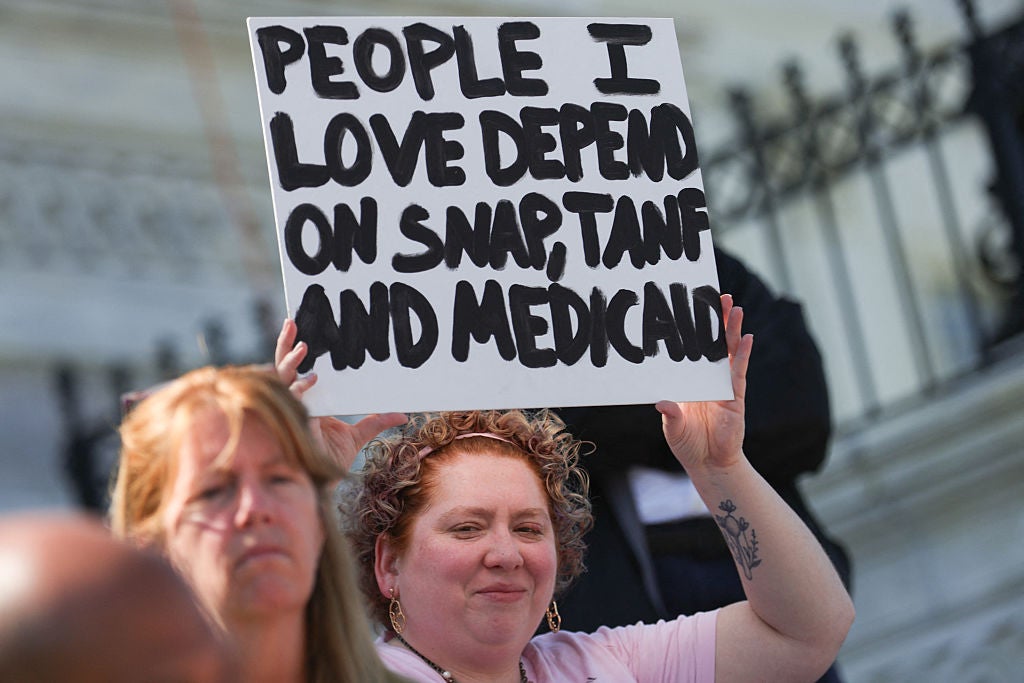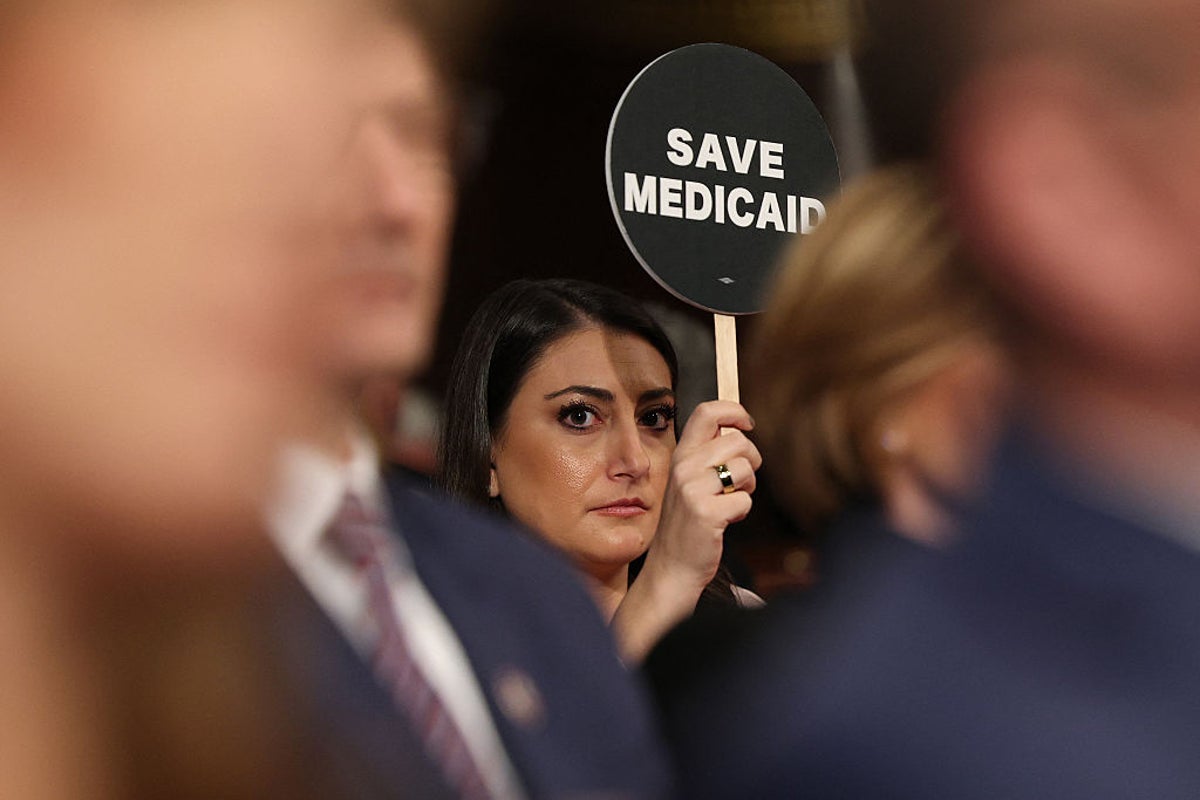House Minority Leader Hakeem Jeffries posed a difficult question to his Democratic caucus during a press conference on Capitol Hill earlier this year.
“What leverage do we have?” the highest-ranking Democrat in the House asked his party.
Increasingly, the answer to that question is Medicaid.
In the minority in both chambers, Jeffries’ party has struggled to find its voice in the first half of 2025. But with their counterparts now split between deficit hawks worried about the ever-growing national debt and another GOP faction fearful of eroding America’s safety net as President Donald Trump’s ‘Big Beautiful Bill’ is taken up by the Senate, some are seeing an opening for the left to score a real victory.
And the battle over Medicaid funding is that target of opportunity. Democrats hope to halt, or at a minimum, change, the Trump budget bill, which currently aims to change the Medicaid system by adding work requirements and other restrictions to the program’s eligibility process.
The Congressional Budget Office (CBO) estimates the so-called BBB will throw millions of people off of the program, mostly through difficulties navigating government red tape.
“What I believe is, if we can get enough people to stand up, and enough people to push back, [the Republicans] can be moved in a lot of places,” said the Rev. William Barber.
Barber, who spoke with The Independent on Monday before being arrested for a prayer demonstration in the U.S. Capitol Rotunda, is leading one of a wide range of left-leaning groups mobilizing against the GOP budget reconciliation bill that passed the House of Representatives in May. A longtime activist for minimum wage increases and other policies to serve low-income communities, Barber spoke about urging faith communities to put pressure on Republicans in districts with high populations of Medicaid-eligible households.
“We’re pushing our congregants to call their legislators hard,” Barber said. “The reason they keep passing it and pushing things in the middle of the night is because they know … if people really knew what was going on, they would be outraged.”
The few Republicans who continue to host in-public town hall events continue to face heckling and disruptions caused by constituents furious about cuts to Medicaid in the budget plan. Iowa Sen. Joni Ernst, over the weekend, issued a mocking apology after going viral for quipping, “Well, we’re all going to die” in response to a shouted accusation about Medicaid cuts from a constituent at her event.
The liberal and progressive groups organizing against the reconciliation package frequently refer back to the last Republican effort to reform health care — the 2017 fight over the Obamacare repeal — as evidence that public sentiment is on their side.
They may be right.
Polling from early May shared with The Independent by the Committee to Protect Heathcare, a progressive group, shows that a clear majority of Americans (62.6 percent) are opposed to Medicaid cuts as a matter of policy, with just 22 percent in favor.
Aimed at pushing groups to further pressure Republicans, the Tavern Research polling memo tested the strength of messaging around opposing Medicaid cuts against GOP candidates and found clear shifts — almost entirely among independents and Republicans — when voters were exposed to that messaging.
A particularly strong line of attack, according to the polling, centers on the risk of hospital closures in rural and other low-income communities, where medical centers often rely heavily on federal Medicare funding. Changes to eligibility requirements that kick millions off the program could quickly put hospitals out of business.
Bruce Siegel, the president of America’s Essential Hospitals, said in May: “This unprecedented level of Medicaid cuts would devastate the program, undermining the ability of essential hospitals to provide critical services, including trauma care, behavioral health, maternal health, and public health emergency response.”
“These hospitals, which already operate on thin margins, cannot absorb such losses without reducing services or closing their doors altogether,” said Siegel, whose group represents dozens of hospitals across the US.
The union representing state and local employees around the country, AFSCME, was also on Capitol Hill in May ahead of the House vote, which opponents see as merely the halfway point in a long battle to stop the Medicaid cuts from becoming law.

Zabdiel Martinez, an AFSCME member and Medicaid eligibility specialist from Wisconsin, was part of the union’s effort to explain how new processes will force many who should be eligible for Medicaid and food stamps (SNAP) out of the programs.
Martinez spoke about how cuts led by DOGE, which hit the Center for Medicare and Medicaid in its firing rampage across the federal government, further endanger the system’s functionality.
“You know, the biggest complaints with … the processes that we have for these programs, is it’s either too complicated or it’s not available enough,” he said. “It really opens my eyes to see – like we need more people, and just by having these cuts, by having this extra tape, it’s not going to offer a solution that I think people are thinking it is going to offer.”
Lee Saunders, AFSCME’s president, wrote in a letter to the union’s members after the budget bill’s passage in the House that their focus was shifting to the Senate, where Republicans like Josh Hawley have expressed doubts about Medicaid cuts, as the effort to change or defeat the bill continues: “This fight is far from over.”
Barber said the reconciliation bill could be the biggest fight for the left this year. He noted that it was also an opportunity to rebuke the Trump administration’s broader agenda, including its ambition to surge funding for the military and deportations, and insisted that Republicans were beginning to feel the pressure — even if the legislation continues to advance through Congress.
“These town halls are starting to get to people,” he said. “Everybody is going to be touched. There’s nobody that doesn’t know somebody who’s on Medicaid, knows somebody whose life was saved through Medicaid, or is on it themselves.”
“This is a moral issue. We’re in a crisis of civilization,” Barber continued. “I believe this bill is forcing [unity on the left] because this is really a matter of death. This is not tiddlywinks.”



